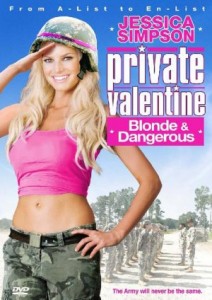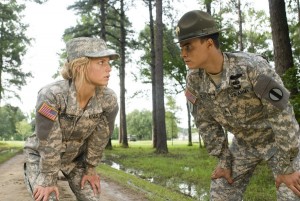
“Major Movie Star,” a.k.a. “Private Valentine: Blonde and Dangerous,” almost works as a satire. The first ten minutes of the film lampoons the Hollywood lifestyle of Megan Valentine (Jessica Simpson), poking fun at her pampered lifestyle, her selfish manager/agent/financial advisor/assistant(s), the paparazzi, and forced relationships for career gain. The most impressive aspect of the opening isn’t even the satire, but how Valentine actually comes across as slightly endearing. While we believe Megan is initially spoiled and selfish, that quickly dissipates when it’s shown she’s tired of being looked down upon and used. At one point, after her agent, Sidney Green (Steve Guttenberg), shoots her down as nothing more than a bubblegum movie star, she breaks down and asks why nobody takes her seriously and, I quote, “Where’s my “Color Purple?” Where’s my “Sling Blade?” This not only makes her slightly sympathetic, but it also delivers a laugh when one imagines Jessica Simpson in the role of Karl Childers.
All of that goodwill is flushed down the toilet once the actual plot kicks in. After her financial advisor steals her entire fortune and she catches her boyfriend sleeping with her manager, Megan is left in ruins. She crashes her car (after avoiding a raccoon), then passes out drunk in front of the army recruitment center. When she awakens the next morning, she’s inspired by the recruitment video to make something of herself and join the army. So far, I’m on board with this. Valentine comes across as genuinely likable and the idea of this comedy mining humor out of her overcoming her bubblegum movie star persona and proving everybody wrong is intriguing; that is, until Valentine resorts to being nothing more than a prissy primadonna who wants to back out of her commitment.

I’d call Valentine’s transformation from a strong-willed woman to a prissy primadonna her reverting back to her original self, but she’s never presented as that to begin with. It makes one wonder why director Steve Miner would endear us to her in the beginning if the plan all along was for her to be a stuck-up bitch who learns the error of her ways in the army. When the film goes through the expected motions and arrives at its final destination, that being Valentine becoming a better and stronger person, I didn’t care because I didn’t believe it for one second. If Megan could go from being endearing to pissy that quickly, then why should I believe she’s officially changed in the end? Because the script says so, apparently.
Speaking of quick emotional turnarounds, all of Valentine’s fellow recruits suffer from this. Steve Miner, who’s most notable directorial efforts include “Friday the 13th Parts II & III,” “Halloween: H20,” “House,” and “Lake Placid,” treats the recruits as if they’re slasher victims. Every recruit only has one characteristic; one is a single mother, one wants to become a doctor, one is dedicating her service to her fallen brother; one (played by Cheri Oteri, thankfully more reserved than usual) is a former sergeant who left the field for love, only to have her heart broken. Since none of them are three-dimensional, Miner uses them as puppets for Valentine, with them hating her the one second, loving her the next, hating her again, and then loving her once and for all. Why am I supposed to believe any of these people when they say they’ve fully turned their lives around?

Even if Valentine remained true to who she was in the beginning of the film, her overcoming the obstacles would still fall flat because her hurdles are lowered. Sergeant Louisa Morely (Vivica A. Fox) is supposed to be tough as nails, but she chooses to toy with Valentine as opposed to treating her like a private. When Valentine tries to leave upon arrival, Morely pretends to let her go, including treating her like royalty because of who she is. I realize that Morely is emotionally breaking Valentine down, but it always comes across as if she’s treating her different (i.e. going lighter on her) because she’s a movie star. This makes all parties look bad, giving the audience nobody to root for.
Regarding Valentine trying to bail from her commitment, her agent actually brings up a solid out for her in the form that she was coerced into joining after suffering from a car accident and being drunk. Not only does this make sense, it pokes a huge hole in the screenplay, which writers April Blair & Kelly Rowe acknowledge by addressing it. The way they decide to keep Valentine in is that the army feels a movie star going AWOL and trashing them in the news is bad for their publicity. This is an asinine thought as the majority of the public would loathe Valentine, a movie star, for trashing the United States army (and rightfully so). This entire sequence could’ve worked had Valentine remained strong and wanted to stay in the army to prove a point to her agent. Alas, that’s not what we get.

What we do get is a lousy comedy that assumes the audience will laugh simply because Jessica Simpson is dressed up as a soldier. We’re supposed to laugh when she has to run and do push-ups because it’s Jessica Simpson doing them. A few satirical gags about her pampered lifestyle are peppered throughout (such as her receiving fan mail at the base and a fellow recruit being an obsessive fan), but not enough to salvage the production. As the film rolled on, I was reminded of the Pauly Shore comedy “In the Army Now” as opposed to “Private Benjamin,” which this is arguably a take-off of. The fact that I began to pine for the Pauly Shore comedy is the harshest criticism I can give this film.
Final Rating: D
